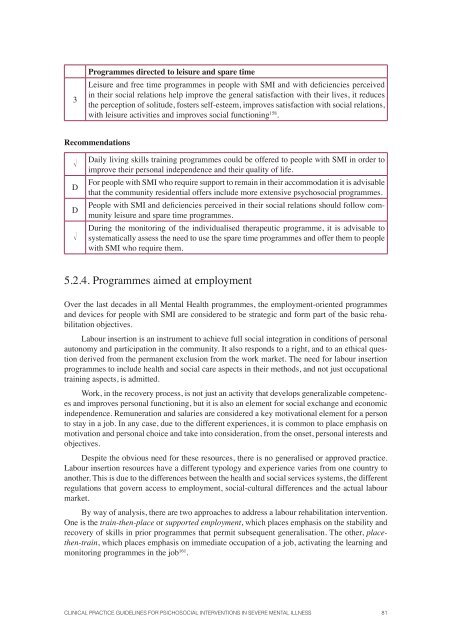CPG for Psychosocial Interventions in Severe Mental ... - GuÃaSalud
CPG for Psychosocial Interventions in Severe Mental ... - GuÃaSalud
CPG for Psychosocial Interventions in Severe Mental ... - GuÃaSalud
Create successful ePaper yourself
Turn your PDF publications into a flip-book with our unique Google optimized e-Paper software.
3<br />
Programmes directed to leisure and spare time<br />
Leisure and free time programmes <strong>in</strong> people with SMI and with deficiencies perceived<br />
<strong>in</strong> their social relations help improve the general satisfaction with their lives, it reduces<br />
the perception of solitude, fosters self-esteem, improves satisfaction with social relations,<br />
with leisure activities and improves social function<strong>in</strong>g 158 .<br />
Recommendations<br />
<br />
D<br />
D<br />
<br />
Daily liv<strong>in</strong>g skills tra<strong>in</strong><strong>in</strong>g programmes could be offered to people with SMI <strong>in</strong> order to<br />
improve their personal <strong>in</strong>dependence and their quality of life.<br />
For people with SMI who require support to rema<strong>in</strong> <strong>in</strong> their accommodation it is advisable<br />
that the community residential offers <strong>in</strong>clude more extensive psychosocial programmes.<br />
People with SMI and deficiencies perceived <strong>in</strong> their social relations should follow community<br />
leisure and spare time programmes.<br />
Dur<strong>in</strong>g the monitor<strong>in</strong>g of the <strong>in</strong>dividualised therapeutic programme, it is advisable to<br />
systematically assess the need to use the spare time programmes and offer them to people<br />
with SMI who require them.<br />
5.2.4. Programmes aimed at employment<br />
Over the last decades <strong>in</strong> all <strong>Mental</strong> Health programmes, the employment-oriented programmes<br />
and devices <strong>for</strong> people with SMI are considered to be strategic and <strong>for</strong>m part of the basic rehabilitation<br />
objectives.<br />
Labour <strong>in</strong>sertion is an <strong>in</strong>strument to achieve full social <strong>in</strong>tegration <strong>in</strong> conditions of personal<br />
autonomy and participation <strong>in</strong> the community. It also responds to a right, and to an ethical question<br />
derived from the permanent exclusion from the work market. The need <strong>for</strong> labour <strong>in</strong>sertion<br />
programmes to <strong>in</strong>clude health and social care aspects <strong>in</strong> their methods, and not just occupational<br />
tra<strong>in</strong><strong>in</strong>g aspects, is admitted.<br />
Work, <strong>in</strong> the recovery process, is not just an activity that develops generalizable competences<br />
and improves personal function<strong>in</strong>g, but it is also an element <strong>for</strong> social exchange and economic<br />
<strong>in</strong>dependence. Remuneration and salaries are considered a key motivational element <strong>for</strong> a person<br />
to stay <strong>in</strong> a job. In any case, due to the different experiences, it is common to place emphasis on<br />
motivation and personal choice and take <strong>in</strong>to consideration, from the onset, personal <strong>in</strong>terests and<br />
objectives.<br />
Despite the obvious need <strong>for</strong> these resources, there is no generalised or approved practice.<br />
Labour <strong>in</strong>sertion resources have a different typology and experience varies from one country to<br />
another. This is due to the differences between the health and social services systems, the different<br />
regulations that govern access to employment, social-cultural differences and the actual labour<br />
market.<br />
By way of analysis, there are two approaches to address a labour rehabilitation <strong>in</strong>tervention.<br />
One is the tra<strong>in</strong>-then-place or supported employment, which places emphasis on the stability and<br />
recovery of skills <strong>in</strong> prior programmes that permit subsequent generalisation. The other, placethen-tra<strong>in</strong>,<br />
which places emphasis on immediate occupation of a job, activat<strong>in</strong>g the learn<strong>in</strong>g and<br />
monitor<strong>in</strong>g programmes <strong>in</strong> the job 161 .<br />
CLINICAL PRACTICE GUIDELINES FOR PSICHOSOCIAL INTERVENTIONS IN SEVERE MENTAL ILLNESS 81

















